Terry Teachout's Blog, page 26
January 24, 2014
TT: See me, hear me (cont'd)
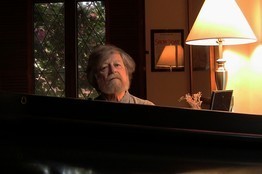 On Sunday afternoon I'll be in Winter Park, Florida, sharing a stage with the American composer Morten Lauridsen, about whom I've written
here
. Lauridsen is coming to Winter Park to attend a concert of his music as performed by John Sinclair and the Bach Festival Society Chorus. Immediately following the performance, I'll join him on stage for a conversation about his life and work.
On Sunday afternoon I'll be in Winter Park, Florida, sharing a stage with the American composer Morten Lauridsen, about whom I've written
here
. Lauridsen is coming to Winter Park to attend a concert of his music as performed by John Sinclair and the Bach Festival Society Chorus. Immediately following the performance, I'll join him on stage for a conversation about his life and work.The concert, which takes place at Rollins College's Knowles Memorial Chapel, starts at three p.m. For more information, or to order tickets, go here .
* * *
Morten Lauridsen's "O magnum mysterium," sung by the Choir of King's College, Cambridge, in 2009. This work will be performed on Sunday:
TT: Almanac
Shunryu Suzuki, Zen Mind, Beginner's Mind
January 23, 2014
TT: So you want to see a show?
Here's my list of recommended Broadway, off-Broadway, and out-of-town shows, updated weekly. In all cases, I gave these shows favorable reviews (if sometimes qualifiedly so) in The Wall Street Journal when they opened. For more information, click on the title.
BROADWAY:
• A Gentleman's Guide to Love & Murder (musical, PG-13, reviewed here)
• Matilda (musical, G, nearly all performances sold out last week, reviewed here)
• No Man's Land/Waiting for Godot (drama, PG-13, playing in rotating repertory, closes Mar. 30, most performances sold out last week, reviewed here)
• Once (musical, G/PG-13, reviewed here)
• Twelfth Night (Shakespeare, G/PG-13, closes Feb. 16, all performances sold out last week, reviewed here)
OFF BROADWAY:
• Avenue Q (musical, R, adult subject matter and one show-stopping scene of puppet-on-puppet sex, reviewed here)
• The Fantasticks (musical, G, suitable for children capable of enjoying a love story, reviewed here)
• Hamlet/Saint Joan (drama, G/PG-13, remounting of off-Broadway production, playing in rotating repertory, closes Mar. 9, original production reviewed here)
IN GLENCOE, ILL.:
• Port Authority (drama, PG-13, closes Mar. 2, reviewed here)
CLOSING SOON OFF BROADWAY:
• King Lear (Shakespeare, PG-13, closes Feb. 9, reviewed here)
• The Commons of Pensacola (drama, PG-13, closes Feb. 9, reviewed here)
CLOSING SOON IN FORT MYERS, FLA.:
• Arsenic and Old Lace (drama, G, extended through Feb. 4, reviewed here)
CLOSING SUNDAY OFF BROADWAY:
• Juno and the Paycock (drama, G/PG-13, far too dark for children, reviewed here)
• The Night Alive (drama, PG-13, reviewed here)
TT: Almanac
Alan Arkin, An Improvised Life
January 22, 2014
TT: Out of circulation
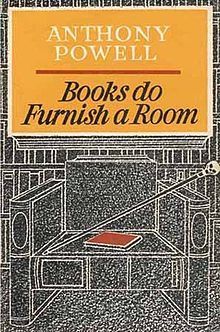 Books Do Furnish a Room and Temporary Kings, the tenth and eleventh novels in A Dance to the Music of Time, Anthony Powell's great roman fleuve, portray the literary life in postwar England, and both volumes are accordingly full of non-existent novels and other books "written" or referred to by Powell's fictional characters.
Books Do Furnish a Room and Temporary Kings, the tenth and eleventh novels in A Dance to the Music of Time, Anthony Powell's great roman fleuve, portray the literary life in postwar England, and both volumes are accordingly full of non-existent novels and other books "written" or referred to by Powell's fictional characters.
Two of these imaginary books, X. Trapnel's Camel Ride to the Tomb and Profiles in String, are central to the plot, but the others are merely mentioned in passing, and Powell, who had an insufficiently appreciated knack for pastiche and parody, clearly had fun with the titles:
Athlete's Footman
Bedsores
Bin Ends
Bronstein: Marxist or Mystagogue?
The Bitch Pack Meets on Wednesday
Borage and Hellebore: A Study
Descartes, Gasendi, and the Atomic Theory of Epicurus
Dogs Have No Uncles
Dust Thou Art
Fields of Amaranth
Garnered at Sunset: Leaves from an Edwardian Journal
Golden Grime
I Stopped at a Chemist
Kleist, Marx, Sartre, the Existentialist Equilibrium
Match Me Such Marvel
Miscellaneous Equities
Moss off a Rolling Stone
The Pistons of Our Locomotives Sing the Songs of Our Workers
Paper Wine
Purged Not in Lethe
Sad Majors
Secretions
Slow on the Feather
A Stockbroker in Sandals
Sweetskin
Unburnt Boats
I'd gladly read some of those--wouldn't you?
TT: Snapshot
(This is the latest in a series of arts-related videos that appear in this space each Monday and Wednesday.)
TT: Almanac
Alan Arkin, An Improvised Life
January 21, 2014
TT: Want not
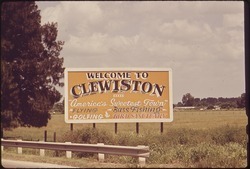 Mrs. T and I had occasion over the weekend to drive all the way across Florida and back again--a total of seven hours on the road--in a single day. Most of our longish trip was spent on a lengthy, lonely stretch of highway along which there is nothing to be seen but orange groves and sugar-cane trees. Then, to our surprise and relief, we finally passed through a city, a farm-and-fishing town called
Clewiston
whose population is 7,000, more or less, and whose city-limit sign, presumably in homage to the local cash crops, proclaims it to be "America's Sweetest Town."
Mrs. T and I had occasion over the weekend to drive all the way across Florida and back again--a total of seven hours on the road--in a single day. Most of our longish trip was spent on a lengthy, lonely stretch of highway along which there is nothing to be seen but orange groves and sugar-cane trees. Then, to our surprise and relief, we finally passed through a city, a farm-and-fishing town called
Clewiston
whose population is 7,000, more or less, and whose city-limit sign, presumably in homage to the local cash crops, proclaims it to be "America's Sweetest Town."That charming boast put smiles on our travel-numbed faces, and we'd have pulled off the road and looked around had we not been in a moderate hurry to get where we were going. Alas, there's not much of Clewiston to be seen from the window of a rental car roaring down Highway 80, just a modest assortment of storefronts, service stations, and fast-food restaurants. The only thing that caught my eye was a small sign that pointed the way to "John Boy Auditorium." I took for granted that it was named after the character from The Waltons, but subsequent investigation disillusioned me. Sometimes truth is stranger than fiction, sometimes not.
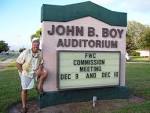 "I wonder what it'd be like to live here," I said. Mrs. T, who is a city girl from top to toe, responded by making a face. But I, having been raised in a town roughly comparable in size to Clewiston, gave my own question serious thought, and replied, "I know one thing--it'd be a lot different from the way it was when I was a boy." She took my point at once.
"I wonder what it'd be like to live here," I said. Mrs. T, who is a city girl from top to toe, responded by making a face. But I, having been raised in a town roughly comparable in size to Clewiston, gave my own question serious thought, and replied, "I know one thing--it'd be a lot different from the way it was when I was a boy." She took my point at once.When I was growing up in Smalltown, U.S.A., our main ties to the outside world were network TV and the public library. Our town had a grand total of two single-screen movie theaters, and there were no chain bookstores or record stores anywhere near us. For most of us, the world we saw was the world we knew. Everything is different now, be it in Smalltown or Clewiston. You can boot up your computer and connect instantly and without effort to an inconceivably vast universe of information. You're only as isolated as you want to be.
Of course I'd miss a lot of things, starting with live theater, if I relocated from Manhattan to a rural town, but I wouldn't be cut off from the world of art and culture, not by the longest of shots. Having lived in New York for more than a quarter of a century, I can't know what it feels like to grow up in a small town today. That's a different experience altogether. But were I now to withdraw to a place like Clewiston, I'd be bringing more than half a lifetime of accumulated cultural capital with me, and I suspect that I'd be able to live off the interest, so to speak, for the rest of my life.
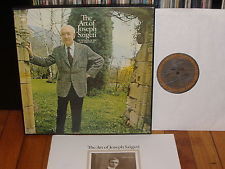 We passed through Clewiston again on our way back to Sanibel Island. This time we paused long enough for me to visit the men's room of the local McDonald's, which was jammed to the walls with hungry patrons. By then the sun had set, and when I got back in the car, I said to Mrs. T, "I believe it's time for some high culture." I slid a CD of Joseph Szigeti playing the Beethoven Violin Concerto into the dashboard deck, and we listened hungrily to that most serene of recorded masterpieces, which can now be
downloaded
from anywhere in the world in a matter of seconds, as we drove through the darkness toward home.
We passed through Clewiston again on our way back to Sanibel Island. This time we paused long enough for me to visit the men's room of the local McDonald's, which was jammed to the walls with hungry patrons. By then the sun had set, and when I got back in the car, I said to Mrs. T, "I believe it's time for some high culture." I slid a CD of Joseph Szigeti playing the Beethoven Violin Concerto into the dashboard deck, and we listened hungrily to that most serene of recorded masterpieces, which can now be
downloaded
from anywhere in the world in a matter of seconds, as we drove through the darkness toward home.Szigeti cut that recording in London in 1932, a quarter-century before I was born, and I first heard it in Smalltown forty years later, having read about it in a now-defunct, much-mourned music magazine called High Fidelity (for which I would later write record reviews) and ordered it from a store in Chicago called Rose Records (also defunct). Even then, the world was smaller than I knew. Now it's smaller than I could possibly have imagined all those years ago. Does that make life better? I wonder about that, too--but I have no doubt that for people like myself, whether old or young, it eases the complicated solitude of being different in a very small town.
* * *
Joseph Szigeti plays an excerpt from the first movement of the Beethoven Violin Concerto, accompanied by Wilfrid Pelletier and the Orchestre de Radio-Canada:
TT: Lookback
A few years ago, I gave a speech in Kansas City, and as part of my fee I was given a completely private tour of the Nelson-Atkins Museum. I went there after hours and was escorted by one of the curators, who switched on the lights in each gallery as we entered and switched them off as we left. I can't begin to tell you what an astonishing and unforgettable impression that visit made on me. To see masterpieces of Western art in perfect circumstances is to realize for the first time how imperfectly we experience them in our everyday lives. It changes the way you feel about museums--and about art itself. I didn't realize it then, but that private view undoubtedly helped to put me on the road to buying art.
Perhaps one of our great museums might consider raffling off a dozen such tours each year. I'm not one for lotteries, but I'd definitely pony up for a ticket....
Read the whole thing here .
TT: Almanac
Alan Arkin, An Improvised Life
Terry Teachout's Blog
- Terry Teachout's profile
- 45 followers



